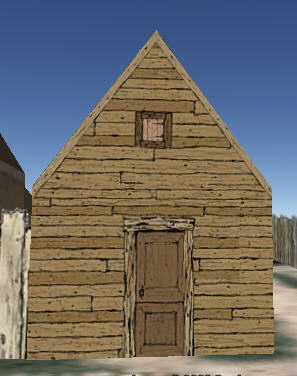Lot
N16
Lot Group
Taxlots
Related Book Page

Property Was Used in 1660 For:
Original Grants and Farms Document(s)
Grant Lot Document(s)
Related Ancestors:
Tax Lot Events
Full Stokes Entry (See images below)
David Jochemszen, of Amsterdam, a shipmaster, married Cristina Capoens, widow of Jacob Heij, August 5, 1659, acquiring this comfortable-looking home and other property by the marriage. — Marriages in Ref. Dutch Ch., 24. In 1677, he was assessed here, on his own house and on the house "where Doctor Lane Liued." — M. C. C, I: 56. This latter house had been built prior to 1672, when it was referred to as "the smal house of David Jochems." — Rec. N. Am., VI: 375. As Domine Selyns mentions Cristina, haus vrouw of Jochemsen, as living here in 1686, the skipper may still have been voyaging to foreign parts. The Labadists met him, coming from England, in 1679. — Journal of Jasper Danckaerts, ed. by James and Jameson, 48.
Jacob Haey had been a trader in Curafao and in Santa Cruz, before 1644; by Ap^ril, 1648, he was in New Amsterdam. His house on the Strand he sold to Cornelis van Tienhoven (see Block F, Lot No. 8; Map of Dutch Grants and Key thereto) after he had built his new house on the Hoogh Straet.
He was, evidently, a prosperous man, as he owned a large plantation on Long Island (in the Greenpoint section), which was cultivated by his negro slaves. Jacob Haey died soon after March 25, 1658. — Rec. N. Am., I: 142, 253, 260, 262, 319; II: 259, 269, 325, 364; III: 144, 412.
On Monday, November 8, 1655, Director-General Stuyvesant and Mr. Silla (De Sille) appeared in court together, and announced that "now Jacob Haey's house is burning." They, evidently, blamed Pieter the Schoorsteenveger for the catastrophe, but the records do not exactly explain his responsibility. — Ibid., I: 391-2.
The lane to the east of this house was very narrow, as the Plan shows, and remained so for a century. On November i, 1754, David Provoost and others petitioned the common council for leave to widen it, stating that "at present the only passage thro Mill Street Commonly Called the Jews Ally is a Narrow Ally of about four feet wide from the upper end of the Said Street to Duke Street." In a long and very interesting statement, they show the inconvenience to the carmen of the city and the great danger in case of fire. Finally, they announce that they "have now an Opportunity of purchasing at a very reasonable price a House and Lott of Ground adjoining to the Said Small Ally which they conceive to be the most proper place for opening a good Passage," and that they have raised £205; they ask the Corporation for £yy: lis. more. The board allowed the petitioners £50, to be paid "this Day three years; provided . . . the Ground . . . Remain a free and publick Street .. . for Ever."—M. C. C, V: 475-6. The street thus deeded (20 feet wide) absorbed this house and part of the garden.—Deeds into the city recorded in Comptroller's Office, Liber C: 135-145; Register's Office, Liber Deeds, XXXVIII: 494, 503.
Jacob Haey had been a trader in Curafao and in Santa Cruz, before 1644; by Ap^ril, 1648, he was in New Amsterdam. His house on the Strand he sold to Cornelis van Tienhoven (see Block F, Lot No. 8; Map of Dutch Grants and Key thereto) after he had built his new house on the Hoogh Straet.
He was, evidently, a prosperous man, as he owned a large plantation on Long Island (in the Greenpoint section), which was cultivated by his negro slaves. Jacob Haey died soon after March 25, 1658. — Rec. N. Am., I: 142, 253, 260, 262, 319; II: 259, 269, 325, 364; III: 144, 412.
On Monday, November 8, 1655, Director-General Stuyvesant and Mr. Silla (De Sille) appeared in court together, and announced that "now Jacob Haey's house is burning." They, evidently, blamed Pieter the Schoorsteenveger for the catastrophe, but the records do not exactly explain his responsibility. — Ibid., I: 391-2.
The lane to the east of this house was very narrow, as the Plan shows, and remained so for a century. On November i, 1754, David Provoost and others petitioned the common council for leave to widen it, stating that "at present the only passage thro Mill Street Commonly Called the Jews Ally is a Narrow Ally of about four feet wide from the upper end of the Said Street to Duke Street." In a long and very interesting statement, they show the inconvenience to the carmen of the city and the great danger in case of fire. Finally, they announce that they "have now an Opportunity of purchasing at a very reasonable price a House and Lott of Ground adjoining to the Said Small Ally which they conceive to be the most proper place for opening a good Passage," and that they have raised £205; they ask the Corporation for £yy: lis. more. The board allowed the petitioners £50, to be paid "this Day three years; provided . . . the Ground . . . Remain a free and publick Street .. . for Ever."—M. C. C, V: 475-6. The street thus deeded (20 feet wide) absorbed this house and part of the garden.—Deeds into the city recorded in Comptroller's Office, Liber C: 135-145; Register's Office, Liber Deeds, XXXVIII: 494, 503.

